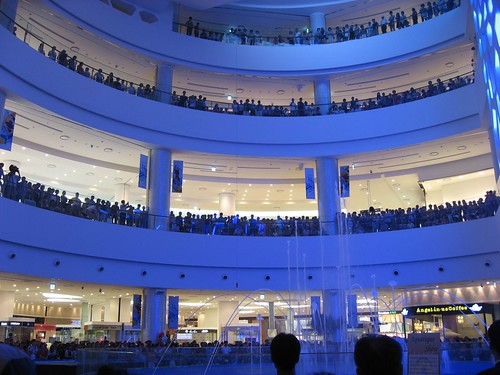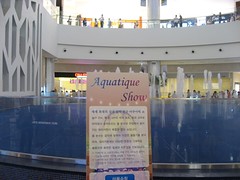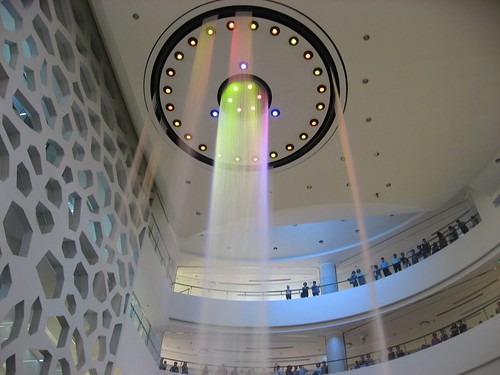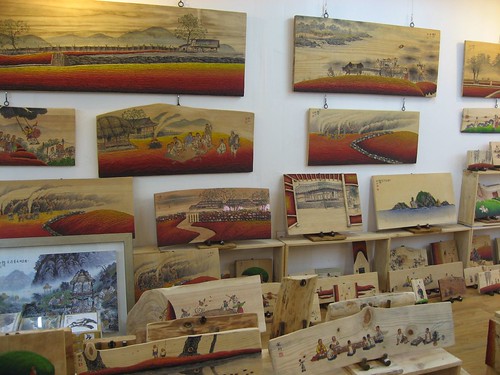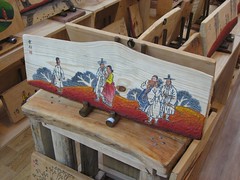Twenty minutes after my son was born, I was finally able to take my first picture of him... through the glass partition of the 'Baby Center'. But that was more than my wife, who despite being awake wasn't able to see him again until 4pm Sunday afternoon - eleven hours after the birth.
I said a mistake was made in those precious few seconds after his birth, and it was that my wife handed our baby back to the impatient staff at their beckoning, and not to me. I would have liked to have held him. But they wanted to take him away and clean him up. It didn't seem unreasonable and I didn't think it was going to have the consequences it did.
Holding the Baby
My only question after taking that first photo was when could I hold my son. The answer wasn't clear, but it certainly became clear over the next 24-hours. I couldn't. The staff were determined in their inflexibility, and I was completely mystified. I couldn't really conceptualise the notion that the staff could refuse me access to my child when both I and my wife wanted me to have that moment. Even though living here has conditioned me to live with the sometimes bizarre cultural mores such as fan death, which people doggedly believe in despite any rational argument to the contrary, this was probably the most surprising cultural difference I'd ever encountered.
When my wife felt better she tackled the staff about the subject. When could I hold my baby for the first time? "In two weeks when you go home." was the rather curt response. And there you have it. The first physical contact I will have with my son won't be for another ten days.
Five Days, 30 Minutes
The visiting times don't help. There are two one-hour visiting sessions and one which lasts 30 minutes at the 'Baby Center'. But that doesn't tell the whole story. What happens is you go, and they place your baby in a crib behind the glass partition, often for around two to three minutes. So five days after the birth I've spent less than half-an-hour with my baby, and of course what I have had has been through that glass partition. Before the birth I didn't know how I'd feel about becoming a father. And now I still don't know, because I don't really feel like one.
Germs and Hygiene
Their reasoning is germs. Fathers are not allowed access to their babies because of germs. I thought this was a little hypocritical of the hospital judging from what I saw of their hygiene standards when my son was born. It didn't really seem to stand up to much rational scrutiny either. Medical staff and mothers were coming in and out of the 'Baby Center' all the time, and they had to put on a gown and wash their hands. I didn't understand why fathers couldn't do the same.
It's also hard to take quite so seriously when you consider that until a few months ago - after we'd chosen this hospital - babies were allowed to stay in the rooms where mothers recuperate for two-to-four weeks after the birth, often with their husbands who stayed with them.
Bubble Boy
If my baby's isolation is rather questionable, mine seems more real. I'm unable to express anything beyond simple concepts in Korean so I have no ability to explain exactly how I feel to any of the medical staff. I know in reality I have no hope of convincing them to change their mind - whatever I have to say about Attachment Theory, my emotional position or basic human rights - but it would at least be a comfort if I could register that intellectual disapproval. I can't and that just adds to my sense of powerlessness.
The truth is that much of my life in Korea comes down to battling the sense of worthlessness which can easily arise from people constantly discussing issues concerning me, and sometimes in front of me, without my input. To an extent that's an inevitable consequence created by the language barrier, but it doesn't make me feel any better. It seems that being dismissed as a non-participant is also the modus operandi at the hospital, except it amplifies my existing sense of living apart from the society I'm supposed to be participating in. The glass wall which divides my son and I serves as a metaphor for my wider experience in Korea.
I feel I've missed out on something important because those first few hours and days are gone now. So to my mind the hospital have taken something from me which I'll never get back. And if anything were to happen without me ever having any physical contact with him I think it would be even more difficult to deal with.
That said, I think I'm getting to a point now where I've gone through disbelief and anger and am arriving at apathy. I'm resigned to not having any real contact with my son until the end of the month. What else can I do? The increasing sense of apathy is better for me than the anger I had before, but I do wonder what a psychologist would make of it - it may not be a healthy emotional start to the bonding process.
Primer
When we signed up this wasn't how the hospital operated and they never said "by the way, we've changed the deal". Once my wife had given birth, and realised they'd changed the way they operated. it wasn't a realistic option to change hospitals so we were stuck with it. I suppose you could argue that it's a breach of contract, but this being Korea there's little to be done about it; consumer rights are comparatively weak here and the law certainly gives the impression of favouring its corporate paymasters. Welcome to Chaebol Country.
If I could go back in time I'd do it differently. So my advice to anyone who finds themselves potentially heading towards the same situation as me here is to think very carefully about what you want out of the experience, and how it's likely to unfold. I wish I'd held my son after he was born and I lost that chance for two weeks. But ultimately it's about more than that. Visiting times are extremely short, my wife doesn't see her baby except when she feeds him which I don't think is emotionally healthy, there may be a worrying lack of emergency backup, and hygiene standards seem questionable at best.
Not all Korean hospitals are going to operate the same way or be the same. Next time - if there is a next time - things have to be different.
Saturday, September 18, 2010
Friday, September 17, 2010
Baby
Five days ago my wife gave birth to our first child, a boy. Over the last couple of years, we'd talked about whether it was better to have a baby in England or Korea. I've always been impressed with the Korean health system - yes, it costs money, but it is fast and efficient in comparison to the slow lumbering bureaucracy of the British National Health Service. Korea seemed to be the clear winner. Now I'm no longer sure. I want to document my experience here as a possibly cautionary tale for other people who find themselves in the same position. Had I known a few months ago what I know now, things may have worked out differently.
I'm splitting what I have to say into the before and after - a tale of two halves if you will, and then there may be quite a lot of post-match analysis, so if you don't want to know the result, look away now.
She's Having a Baby
My wife's water broke at 9.35pm on Saturday evening. The hospital said she had time for a shower before checking in. That's important because Koreans firmly believe that women can not take a shower or bath for a week or more after giving birth otherwise it will damage their health for life - after giving birth Korean people's bones are 'brittle'.
An hour later we arrived at the hospital. It's not a huge state-run complex of buildings as you would expect to find in the UK, but rather eleven stories of a very small office block situated on a major road. Like most Korean hospitals, it's specialised - in this case, as a maternity hospital. When we reached the delivery floor, we stepped out of the elevator into a small empty waiting area. I soon discovered that the entire floor was being staffed by one nurse, although since there was only another patient there, who was busy screaming in agony, perhaps that was the appropriate staffing level. The nurse split her time between checking us in and disappearing into the first delivery room to admonish the woman for her behaviour. Really.
Korean Mother was with us, and she went down on the forms as the next-of-kin. My inability to communicate at the level of Korean necessary to deal with a medical emergency made it necessary, but that was to prove only the first of a series of unhappy experiences during the next few hours.
The Red Gloves
The unseen woman gave birth and the baby cried for around a minute before silence descended on the otherwise unoccupied delivery floor. Retrospectively, I see now I should have seen that as a clue, but my head was full of other thoughts. We were in the next door delivery room by now with my wife lying on the bed. The nurse entered with heavily bloodied surgical gloves and much to my shock began adjusting my wife's bed and bedding. Korean hospitals have always seemed to have good hygiene standards so this wasn't what I expected at all. It turned out my wife was already 30% dilated so we were told the baby was likely to come by the morning.
I suppose the room wasn't quite what I expected either. It was very cramped - only wide enough for one person to stand on either side of the bed - and it didn't fit my possibly wrong image of the clinically clean environment I'd expected. It was really just a room, with some rather dingy circa-1970s wallpaper.
I'd chosen to be present in the room during my wife's birth. I don't think this is really negotiable for British people and it would be very unusual if you didn't want to be. I got the impression that Korean men are not so enthusiastic about the idea, and I was told the husband of our neighbour stayed outside for the big moment. But again, the reality was different from my expectations. Korean Mother and I were regularly told to leave by the nurse and the pedometer that I wore eventually told me I'd walked over a kilometre in the corridor outside, partly out of frustration and partly just to keep myself awake. Korean Mother took to crouching by the entrance to the curtain-off delivery room chanting Buddhist mantras over and over.
The Wreck of the Mary Celeste
It was while I was pacing up and down the narrow and claustrophobic corridor of the Mary Celeste Maternity Hospital that I finally started looking at the crib positioned near to the door of my wife's delivery room. A green blanket sat in it and it was stained with blood and other bodily fluids. Another equally stained blanket lay underneath it. I suppose the hospital would argue that they were perfectly clean despite their appearances, but I was so surprised I took a photo of it. Unfortunately, I'd left my DSLR in the maternity room and was only carrying my compact digital camera, which I discovered had developed a fault preventing me from altering its settings, so the noisy picture didn't do the reality of it justice. Anyway, I was rather surprised, and not in a good way.
My wife was determined not to be a screamer so only moaned occasionally, but even after two epidurals she was in considerable pain by 3.30am, which is when apparently to her great surprise the nurse discovered that my wife was 80% dilated, suddenly moving the expected time of arrival up a number of hours. The nurse had now been the only person we'd seen since arriving five hours earlier, but she began making phone calls to a doctor, giving me some comfort that we really weren't the only people in the entire building. But lingering questions remained in my mind - if there was an emergency, how equipped was a small hospital like this to cope with it? How long would it take a crash team to get here? Did they even have one? No, say what you like about British hospitals, at least you probably have every conceivable specialist to hand if there's a problem. I began to think a larger Korean hospital might have been a better plan.
Push Pull
Within half an hour the nurse was giving instructions to push but there was still no sign of the doctor despite a series of phone calls. In my mind I'd editorialised them as increasingly urgent pleas of 'where are you?', but perhaps it wasn't.
Twenty minutes later the nurse, whose attendance throughout the night had been sporadic despite the theoretical one-to-one ratio of nursing care, disappeared, leaving Korean Mother to work with her daughter on the pushing. When the nurse returned, with the doctor, a second nurse, and a large vacuum pump in tow, we were bundled out of the room. I discovered later that the baby had been judged to be stuck, but my language isolation prevented me from understanding what was happening and Korean Mother didn't appear to know either. Her Buddhist chanting became louder which I didn't take as a particularly positive sign. It was a critical time in the delivery, and we were kept outside for twenty minutes, but they hadn't properly closed the curtain to the room, so occasionally I managed to see beyond the medical staff to the horrors that lay beyond. My wife had clearly lost quite a lot of blood. It's hard to know at the time what can be considered normal, so I wasn't especially worried, but later she had to have a transfusion.
30 Seconds Over Tokyo
We were finally called in three minutes before the birth, and for the first time we had to wear gowns - but no masks. Because of the cramped conditions - caused in no small part by the large vacuum pump that was already attached to my wife, I could only stand at the top of the bed, so when the baby came it's the only angle I could see it from. The umbilical cord was clamped and I was given what felt like the world's bluntest scissors to cut it with. Yes, Korean men apparently might sit out the actual delivery, but its normal for them to cut the umbilical cord.
We'd had all these grand plans about taking lots of photos and even filming the moment of birth, but in the reality of the situation it seemed heartless to take pictures like a tourist when my wife needed my full attention. When the birth happened at 4.57am it was so quick that I was taken aback. I didn't understand how rapid the vacuum pump could be, although having seen my baby sucked out of its home head first like that I think I understand why so many people in the modern world have nightmares about being abducted from their beds by aliens. I was quickly conscripted into cutting the cord and then the baby was passed to its mother while I struggled - and failed - with the now certainly faulty camera I had to hand to take a shot. I couldn't reach my DSLR in time. Thirty seconds later the baby was bundled outside by the nurses and I once again tried and failed to take a photo in the corridor despite the protestations of the staff. Blink and you'll miss it. Our baby was hurried away.
In the end, while giving birth is a terribly hard thing to go through, it ended up being comparatively straightforward. The baby was fine and after a couple of days, my wife was much better too. But a mistake was made during that thirty second period and it was going to linger with me and cause a great deal of unhappiness and frustration.
I'm splitting what I have to say into the before and after - a tale of two halves if you will, and then there may be quite a lot of post-match analysis, so if you don't want to know the result, look away now.
She's Having a Baby
My wife's water broke at 9.35pm on Saturday evening. The hospital said she had time for a shower before checking in. That's important because Koreans firmly believe that women can not take a shower or bath for a week or more after giving birth otherwise it will damage their health for life - after giving birth Korean people's bones are 'brittle'.
An hour later we arrived at the hospital. It's not a huge state-run complex of buildings as you would expect to find in the UK, but rather eleven stories of a very small office block situated on a major road. Like most Korean hospitals, it's specialised - in this case, as a maternity hospital. When we reached the delivery floor, we stepped out of the elevator into a small empty waiting area. I soon discovered that the entire floor was being staffed by one nurse, although since there was only another patient there, who was busy screaming in agony, perhaps that was the appropriate staffing level. The nurse split her time between checking us in and disappearing into the first delivery room to admonish the woman for her behaviour. Really.
Korean Mother was with us, and she went down on the forms as the next-of-kin. My inability to communicate at the level of Korean necessary to deal with a medical emergency made it necessary, but that was to prove only the first of a series of unhappy experiences during the next few hours.
The Red Gloves
The unseen woman gave birth and the baby cried for around a minute before silence descended on the otherwise unoccupied delivery floor. Retrospectively, I see now I should have seen that as a clue, but my head was full of other thoughts. We were in the next door delivery room by now with my wife lying on the bed. The nurse entered with heavily bloodied surgical gloves and much to my shock began adjusting my wife's bed and bedding. Korean hospitals have always seemed to have good hygiene standards so this wasn't what I expected at all. It turned out my wife was already 30% dilated so we were told the baby was likely to come by the morning.
I suppose the room wasn't quite what I expected either. It was very cramped - only wide enough for one person to stand on either side of the bed - and it didn't fit my possibly wrong image of the clinically clean environment I'd expected. It was really just a room, with some rather dingy circa-1970s wallpaper.
I'd chosen to be present in the room during my wife's birth. I don't think this is really negotiable for British people and it would be very unusual if you didn't want to be. I got the impression that Korean men are not so enthusiastic about the idea, and I was told the husband of our neighbour stayed outside for the big moment. But again, the reality was different from my expectations. Korean Mother and I were regularly told to leave by the nurse and the pedometer that I wore eventually told me I'd walked over a kilometre in the corridor outside, partly out of frustration and partly just to keep myself awake. Korean Mother took to crouching by the entrance to the curtain-off delivery room chanting Buddhist mantras over and over.
The Wreck of the Mary Celeste
It was while I was pacing up and down the narrow and claustrophobic corridor of the Mary Celeste Maternity Hospital that I finally started looking at the crib positioned near to the door of my wife's delivery room. A green blanket sat in it and it was stained with blood and other bodily fluids. Another equally stained blanket lay underneath it. I suppose the hospital would argue that they were perfectly clean despite their appearances, but I was so surprised I took a photo of it. Unfortunately, I'd left my DSLR in the maternity room and was only carrying my compact digital camera, which I discovered had developed a fault preventing me from altering its settings, so the noisy picture didn't do the reality of it justice. Anyway, I was rather surprised, and not in a good way.
My wife was determined not to be a screamer so only moaned occasionally, but even after two epidurals she was in considerable pain by 3.30am, which is when apparently to her great surprise the nurse discovered that my wife was 80% dilated, suddenly moving the expected time of arrival up a number of hours. The nurse had now been the only person we'd seen since arriving five hours earlier, but she began making phone calls to a doctor, giving me some comfort that we really weren't the only people in the entire building. But lingering questions remained in my mind - if there was an emergency, how equipped was a small hospital like this to cope with it? How long would it take a crash team to get here? Did they even have one? No, say what you like about British hospitals, at least you probably have every conceivable specialist to hand if there's a problem. I began to think a larger Korean hospital might have been a better plan.
Push Pull
Within half an hour the nurse was giving instructions to push but there was still no sign of the doctor despite a series of phone calls. In my mind I'd editorialised them as increasingly urgent pleas of 'where are you?', but perhaps it wasn't.
Twenty minutes later the nurse, whose attendance throughout the night had been sporadic despite the theoretical one-to-one ratio of nursing care, disappeared, leaving Korean Mother to work with her daughter on the pushing. When the nurse returned, with the doctor, a second nurse, and a large vacuum pump in tow, we were bundled out of the room. I discovered later that the baby had been judged to be stuck, but my language isolation prevented me from understanding what was happening and Korean Mother didn't appear to know either. Her Buddhist chanting became louder which I didn't take as a particularly positive sign. It was a critical time in the delivery, and we were kept outside for twenty minutes, but they hadn't properly closed the curtain to the room, so occasionally I managed to see beyond the medical staff to the horrors that lay beyond. My wife had clearly lost quite a lot of blood. It's hard to know at the time what can be considered normal, so I wasn't especially worried, but later she had to have a transfusion.
30 Seconds Over Tokyo
We were finally called in three minutes before the birth, and for the first time we had to wear gowns - but no masks. Because of the cramped conditions - caused in no small part by the large vacuum pump that was already attached to my wife, I could only stand at the top of the bed, so when the baby came it's the only angle I could see it from. The umbilical cord was clamped and I was given what felt like the world's bluntest scissors to cut it with. Yes, Korean men apparently might sit out the actual delivery, but its normal for them to cut the umbilical cord.
We'd had all these grand plans about taking lots of photos and even filming the moment of birth, but in the reality of the situation it seemed heartless to take pictures like a tourist when my wife needed my full attention. When the birth happened at 4.57am it was so quick that I was taken aback. I didn't understand how rapid the vacuum pump could be, although having seen my baby sucked out of its home head first like that I think I understand why so many people in the modern world have nightmares about being abducted from their beds by aliens. I was quickly conscripted into cutting the cord and then the baby was passed to its mother while I struggled - and failed - with the now certainly faulty camera I had to hand to take a shot. I couldn't reach my DSLR in time. Thirty seconds later the baby was bundled outside by the nurses and I once again tried and failed to take a photo in the corridor despite the protestations of the staff. Blink and you'll miss it. Our baby was hurried away.
In the end, while giving birth is a terribly hard thing to go through, it ended up being comparatively straightforward. The baby was fine and after a couple of days, my wife was much better too. But a mistake was made during that thirty second period and it was going to linger with me and cause a great deal of unhappiness and frustration.
Tags:
babies,
culture shock,
health,
language
Location:
Busan, South Korea
Monday, September 06, 2010
Aquatic House Party
"Our department store is turning into an amusement park."
When Lotte opened a large department store in the Gwangbokdong area of Busan it didn't seem quite finished. They were still building a new section but it finally opened last week to reveal even more designer stores, and to try and balance the cultural vacuum they create, a large bookstore and 430-seat concert hall on the higher floors. The centrepiece of the new space features fountains and a waterfall. A Lotte Mart and Lotte Cinema are next to be built. Construction will be completed in 2016 with a large Lotte apartment skyscraper which will provide - possibly in breach of the Geneva Convention - a captive audience for all things Lotte. It's a cunning business strategy but you certainly won't catch me living there. Well, not until 2016 anyway.
I went to Gwangbokdong the day after the 'Aqua Mall' opened to take a look, not honestly expecting to see very much, but Lotte were holding an 'Aquatique Show' which you can tell was meant to be something special because they used a French word. Some foreign gymnasts - probably not French - were performing a floor show and there may have been clowns buried deep within the crowd to add to that slightly uncomfortable circus feeling.
It appeared that someone from head office in Seoul was visiting, but perhaps he was not a fan of the entertainment - "Our department store is turning into an amusement park. Is this so fascinating?", adding words to the effect of 'people in Busan are easily pleased'. No, let's be honest, what he actually said was "What a bunch of countryside people". His Busan colleagues then nudged him to be quiet. You never know who's listening, but I think he got away with it. Anyway, I shouldn't be too hard on him, he's only saying what most people from Seoul think.
If he thinks people in Busan are easily pleased, he doesn't know the people here I do. In fact, 74.4 percent of workers in Korea said they thought their jobs had driven them to depression in a recent survey. People need their distractions. Plus, it's not easy deciding which of forty designer stores to buy yet another $1,000 handbag from. Very stressful.
It's also easy to be blasé about the importance of what you have when you spend your day working in a regulation 26°C air conditioned 50% humidity environment. Many shoppers in the crowd had just escaped from the 34 degree 80% humidity outside and after that, the sight of fountains and cascading torrents of water falling from the ceiling is practically pornographic.
When Lotte opened a large department store in the Gwangbokdong area of Busan it didn't seem quite finished. They were still building a new section but it finally opened last week to reveal even more designer stores, and to try and balance the cultural vacuum they create, a large bookstore and 430-seat concert hall on the higher floors. The centrepiece of the new space features fountains and a waterfall. A Lotte Mart and Lotte Cinema are next to be built. Construction will be completed in 2016 with a large Lotte apartment skyscraper which will provide - possibly in breach of the Geneva Convention - a captive audience for all things Lotte. It's a cunning business strategy but you certainly won't catch me living there. Well, not until 2016 anyway.
I went to Gwangbokdong the day after the 'Aqua Mall' opened to take a look, not honestly expecting to see very much, but Lotte were holding an 'Aquatique Show' which you can tell was meant to be something special because they used a French word. Some foreign gymnasts - probably not French - were performing a floor show and there may have been clowns buried deep within the crowd to add to that slightly uncomfortable circus feeling.
It appeared that someone from head office in Seoul was visiting, but perhaps he was not a fan of the entertainment - "Our department store is turning into an amusement park. Is this so fascinating?", adding words to the effect of 'people in Busan are easily pleased'. No, let's be honest, what he actually said was "What a bunch of countryside people". His Busan colleagues then nudged him to be quiet. You never know who's listening, but I think he got away with it. Anyway, I shouldn't be too hard on him, he's only saying what most people from Seoul think.
If he thinks people in Busan are easily pleased, he doesn't know the people here I do. In fact, 74.4 percent of workers in Korea said they thought their jobs had driven them to depression in a recent survey. People need their distractions. Plus, it's not easy deciding which of forty designer stores to buy yet another $1,000 handbag from. Very stressful.
It's also easy to be blasé about the importance of what you have when you spend your day working in a regulation 26°C air conditioned 50% humidity environment. Many shoppers in the crowd had just escaped from the 34 degree 80% humidity outside and after that, the sight of fountains and cascading torrents of water falling from the ceiling is practically pornographic.
Wednesday, September 01, 2010
Feat of Clay
Recently I stumbled across a shop selling art in the Gwangbok Underground Shopping Area near Nampodong's Lotte Department Store. There's nothing particularly unusual about this - the underground shopping district is extensive and there are a number of artworks on display, but they are usually the kind of typical Korean fare popular with tourists and apartment living rooms. Colours are often limited to black and white. What made this particular shop stand out were the vibrant reds and greens enticing the visitor inside.
The particular artist concerned has taken to updating traditional Korean black and white flat paintings with red and green coloured clay which also adds a relief and therefore more depth to the work. I doubt it's the case that what the artist is doing is unique, but in all my time trudging through the back-streets of Busan I've never seen anything quite like it. It's easy for art to stagnate and become almost a stereotype of itself, but it's exciting to think that despite the temptation to pump out the old clichés, that someone out there in Busan is prepared to take an old favourite and give it an updated spin. More images are available on the artist's (정창원 - Jung Chang-Won) website.
The particular artist concerned has taken to updating traditional Korean black and white flat paintings with red and green coloured clay which also adds a relief and therefore more depth to the work. I doubt it's the case that what the artist is doing is unique, but in all my time trudging through the back-streets of Busan I've never seen anything quite like it. It's easy for art to stagnate and become almost a stereotype of itself, but it's exciting to think that despite the temptation to pump out the old clichés, that someone out there in Busan is prepared to take an old favourite and give it an updated spin. More images are available on the artist's (정창원 - Jung Chang-Won) website.
Subscribe to:
Posts (Atom)
